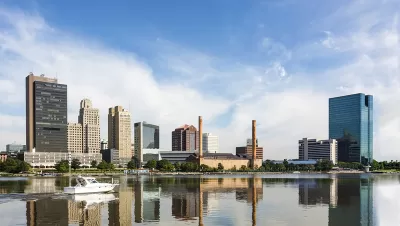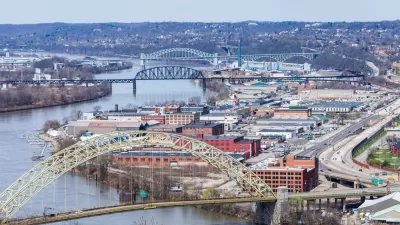The city of Toledo, Ohio provides a case study in how the best intentions of attracting degree-holding Millennials can come up short.

"Toledo continues to show signs of becoming more cool, hip, and attractive to college-educated young people," report Tom Henry and Gabby Deutch,"[b]ut statistics show the rebranding effort isn’t generating results as quickly as people want."
The article shares the results of a study of U.S. Census data commissioned by the Pew Charitable Trusts, finding that "Toledo ranked only 455th out of 521 U.S. cities for percentage growth of degree-holding Millennials between 2000 and 2014."
The article also compares the data on Millennials in Toledo to the data from other cities likes Baltimore, St. Louis, and Pittsburgh, which have all had more success in the effort. The article describes the data from Toledo as an example of the limitations of the "Rust Belt chic" model of redeveloping old buildings "with character," but "nearly 10 years after the Toledo Regional Chamber of Commerce launched a campaign to halt the so-called 'brain drain' Toledo and other Rust Belt cities were experiencing, the city is finding that retaining and attracting more college-educated Millennials require more than just a good coffeehouse," write Henry and Deutch.
The article calls on national experts, like William Frey from the Brookings Institution’s Metropolitan Policy Program, and local academics to paint a detailed portrait of the many community and economic development underway in recent years in Toledo.
FULL STORY: Toledo struggles to attract, keep young professionals

Alabama: Trump Terminates Settlements for Black Communities Harmed By Raw Sewage
Trump deemed the landmark civil rights agreement “illegal DEI and environmental justice policy.”

Study: Maui’s Plan to Convert Vacation Rentals to Long-Term Housing Could Cause Nearly $1 Billion Economic Loss
The plan would reduce visitor accommodation by 25% resulting in 1,900 jobs lost.

Why Should We Subsidize Public Transportation?
Many public transit agencies face financial stress due to rising costs, declining fare revenue, and declining subsidies. Transit advocates must provide a strong business case for increasing public transit funding.

Paris Bike Boom Leads to Steep Drop in Air Pollution
The French city’s air quality has improved dramatically in the past 20 years, coinciding with a growth in cycling.

Why Housing Costs More to Build in California Than in Texas
Hard costs like labor and materials combined with ‘soft’ costs such as permitting make building in the San Francisco Bay Area almost three times as costly as in Texas cities.

San Diego County Sees a Rise in Urban Coyotes
San Diego County experiences a rise in urban coyotes, as sightings become prevalent throughout its urban neighbourhoods and surrounding areas.
Urban Design for Planners 1: Software Tools
This six-course series explores essential urban design concepts using open source software and equips planners with the tools they need to participate fully in the urban design process.
Planning for Universal Design
Learn the tools for implementing Universal Design in planning regulations.
Smith Gee Studio
Alamo Area Metropolitan Planning Organization
City of Santa Clarita
Institute for Housing and Urban Development Studies (IHS)
City of Grandview
Harvard GSD Executive Education
Toledo-Lucas County Plan Commissions
Salt Lake City
NYU Wagner Graduate School of Public Service





























